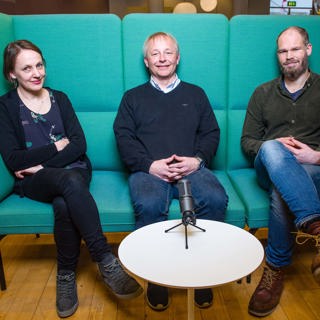
How much of a risk is space junk?
Space junk. It might sound like an out-of-this-world problem that we don’t need to worry about here on Earth – but is it? As we send more and more metal in the form of satellites up into space, scientists are warning it is becoming more of a risk both here – and up there. We dig into the problem and what’s being done to clean it up. Also this week, we answer a listener question about oceans and their influence on global temperatures, and we ponder the use – and sometimes abuse – of scientific language. And with the Paris Olympics well under way, how much does sex affect sporting performance? Presenter: Victoria Gill Producers: Ella Hubber & Gerry Holt Editor: Martin Smith Production Co-ordinator: Jana Bennett-Holesworth
29 Aug 202428min

CERN’s Supercollider Plan
CERN’s plans to build a bigger, faster particle collider, with a hefty 17 billion Euro price tag, are in question. Physicists Andrew Pontzen and Harry Cliff discuss if the new machine is really worth it. A place on the podium or disappointment in the Olympics can come down to the precise position of a foot or angle of the hips. Science reporter Ella Hubber visits the University of Bath to check out the motion capture tech that makes these measurements. New research suggests our close cousins, the chimpanzees, chat just as fast as humans. Professor Cat Hobaiter from the University of St Andrews tells us what chimp chats can teach us about the evolution of language. 75 years after making a groundbreaking discovery, Rosemary Fowler has finally been awarded with an honorary doctorate. University of Bristol chancellor, Sir Paul Nurse, shares how important it is to celebrate and recognise Rosemary’s achievements.Presenter: Victoria Gill Producers: Ella Hubber and Sophie Ormiston Editor: Martin Smith Production Co-ordinator: Jana Bennett-Holesworth
22 Aug 202428min

Should Antarctica be off limits?
Antarctica is a 'natural reserve, devoted to peace and science' - that’s according to an international treaty. But with visitor numbers at a record high, how does tourism fit into that – and what kind of impact is it having on its fragile ecosystem? We discuss whether tourists – and even scientists – should be allowed to go at all. Swimming in the Seine has been banned for more than a century because of pollution concerns. The main culprit? Human waste. We find out if it really will be safe in time. And every summer we ready ourselves for 'flying ant day' – that one day where winged ants take to the skies across Britain. Or do they? Presenter: Victoria Gill Producers: Sophie Ormiston, Ella Hubber and Gerry Holt Editor: Martin Smith Production Co-ordinator: Jana Bennett-Holesworth
15 Aug 202428min

Wimbledon Grass Science
We visit Wimbledon’s iconic Centre Court... but we’re not interested in the tennis, we want to know all about the grass. Just how important is science to cultivating the perfect playing surface? Also this week, we discuss the aims and ethics of human stem-cell-based embryo models in research after a new code of practice for the UK made headlines. And we answer a listener question about whether white paint could help tackle climate change. Send your burning science questions to insidescience@bbc.co.uk. Presenter: Marnie Chesterton Producers: Ella Hubber, Sophie Ormiston & Gerry Holt Editor: Colin Paterson Production Co-ordinator: Jana Bennett-Holesworth
8 Aug 202428min

Sun, sea... and science
It’s election time but over here in Science Land, we’re heading off to the seaside for our summer special. We chat seagulls with Professor Paul Graham on Brighton beach and find out why they are so misunderstood - from what we call them to why they pinch our chips. We bust some sun safety myths with dermatologist Dr Jess Felton and find out why ice cream is such a chemical marvel with chef Terri Mercieca. And we join in the festivities at the Royal Society’s Summer Science Exhibition. Presenter: Marnie Chesterton Producers: Sophie Ormiston, Ella Hubber & Gerry Holt Editor: Colin Paterson Production Co-ordinator: Jana Bennett-Holesworth
1 Aug 202428min

What makes an effective protest?
As another week of disruptive Just Stop Oil protests grabs media attention, sociologist Dana Fisher discusses which actions might help a cause - and which could harm it.Japanese scientists have developed artificial skin for robots made from real human cells. Inside Science producer Dr Ella Hubber digs into the uncanny invention. Inside Science reporter Patrick Hughes goes on the trail of methane emissions from landfills. And, as a heatwave smothers the UK, physiologist Damian Bailey helps us figure out what the perfect temperature for a human is. Presenter: Marnie Chesterton Producers: Ella Hubber, Gerry Holt, Sophie Ormiston Editor: Martin Smith Production Co-ordinator: Jana Bennett-Holesworth
25 Jul 202428min

Taylor Swift Seismology
Taylor Swift fans danced so hard they made the ground shake at her recent Edinburgh gig so this week we’re meeting Earth Scientists Emma Greenough and James Panton to measure the Cardiff show - and explain some Swiftie Seismology. We’re joined by the BBC’s disinformation and social media correspondent Marianna Spring and Cardiff University's Professor Martin Innes to talk the science of tracking election disinformation on social media. What’s in the election manifestos? BBC science correspondent Pallab Ghosh explains all. And Marnie dashes to Kew Gardens to meet horticulturalist Solene Dequiret, hoping to be in time to see two very foul-smelling plants in very rare bloom. Nose pegs at the ready...Presenter: Marnie Chesterton Producers: Gerry Holt, Katie Tomsett & Ella Hubber Editor: Martin Smith Production Co-ordinator: Jana Bennett-Holesworth
18 Jul 202428min

Are implanted brain chips the future?
Elon Musk’s implanted brain chip, Neuralink, is coming to the UK for clinical trials. Is controlling computers with our minds a future reality or is it all hype? Neuroscientists Dean Burnett and Christina Maher weigh in.Zoologist Jules Howard ponders the strange effects drugs in our sewage have on frogs from his garden pond. How do we measure the distance to distant galaxies? Astrophysicist Edward Gomez answers a listener's burning question. And a 101 on blood groups from Dr Lise Estcourt. Presenter: Marnie Chesterton Producers: Ella Hubber, Gerry Holt, Sophie Ormiston Editor: Martin Smith Production Co-ordinator: Jana Bennett-Holesworth BBC Inside Science is produced in collaboration with the Open University.
11 Jul 202428min




















